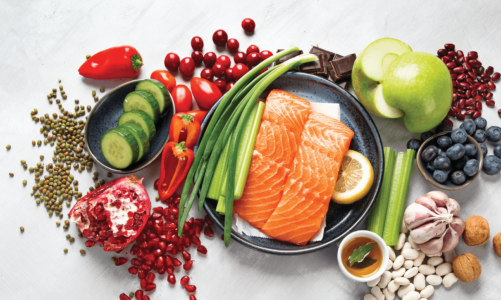As a parent, ensuring the well-being and strong immune system of your child is a top priority. While there is no magic pill to prevent illnesses, a balanced and nutritious diet plays a vital role in supporting your child’s immune system. In this article, we will explore a variety of essential foods that can help boost your child’s immunity and promote their overall health.
1. Colorful Fruits and Vegetables:
Encouraging your child to consume a wide range of colorful fruits and vegetables is an excellent way to enhance their immune system. These foods are rich in essential vitamins, minerals, and antioxidants. Vitamin C, found in citrus fruits like oranges and strawberries, helps strengthen the immune system. Carrots, sweet potatoes, and dark leafy greens provide beta-carotene, which is converted into vitamin A, crucial for maintaining the health of the skin and mucous membranes.
2. Protein-Rich Foods:
Protein is an essential component for building and repairing tissues, including those involved in immune function. Foods like lean meats, poultry, fish, eggs, dairy products, and legumes are excellent sources of protein. Include a variety of these foods in your child’s diet to ensure they receive a good balance of essential amino acids.
3. Healthy Fats:
Incorporating healthy fats into your child’s diet can support their immune system. Foods like avocados, nuts, seeds, and oily fish (such as salmon and sardines) contain omega-3 fatty acids, which have anti-inflammatory properties. These fats help maintain the integrity of cell membranes and support the immune system’s response to infections.
4. Whole Grains:
Whole grains, such as brown rice, whole wheat bread, and oatmeal, are rich in fiber, vitamins, and minerals. They provide sustained energy, helping your child stay active and maintaining their overall health. The fiber in whole grains supports a healthy gut microbiome, which plays a crucial role in immune function.
5. Probiotic Foods:
The gut microbiome plays a significant role in immune health, and consuming probiotic-rich foods can support its balance. Yogurt, kefir, sauerkraut, kimchi, and other fermented foods contain beneficial bacteria that can strengthen the immune system and promote good digestion.
6. Nuts and Seeds:
Nuts and seeds are packed with essential nutrients and healthy fats that are vital for your child’s growth and immunity. Almonds, walnuts, flaxseeds, and chia seeds are excellent choices. They provide vitamin E, zinc, and selenium, which act as antioxidants and support immune function.
7. Garlic and Onions:
Garlic and onions are known for their immune-boosting properties. They contain compounds like allicin and quercetin, which have antimicrobial and anti-inflammatory effects. Including these ingredients in your child’s meals can help support their immune system.
8. Citrus Fruits:
Citrus fruits like oranges, grapefruits, lemons, and limes are rich in vitamin C, a powerful antioxidant that helps enhance immune function. Encourage your child to enjoy these fruits as a snack or incorporate them into their meals and beverages.
9. Berries:
Berries, such as strawberries, blueberries, and raspberries, are packed with antioxidants and vitamins that promote a healthy immune system. They also provide dietary fiber, which aids in digestion and overall well-being.
10. Fluids:
Staying properly hydrated is essential for maintaining a healthy immune system. Encourage your child to drink an adequate amount of water throughout the day. Additionally, including herbal teas and homemade fruit juices (without added sugars) can provide extra nutrients and hydration.
Conclusion:
Building a strong immune system in children requires a combination of various factors, including a balanced diet. By incorporating these essential foods into your child’s daily meals and snacks, you can help support their immune system and promote overall health. Remember to offer a variety of foods to ensure they receive a wide range of nutrients. Additionally, creating a positive eating environment and setting a good example with your own healthy choices can encourage your child to develop lifelong healthy eating habits.




